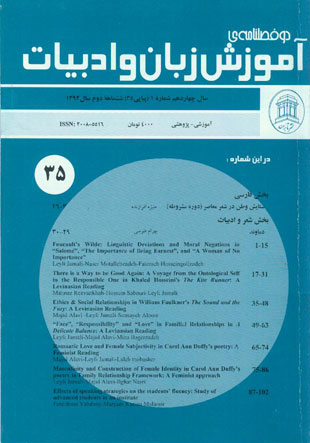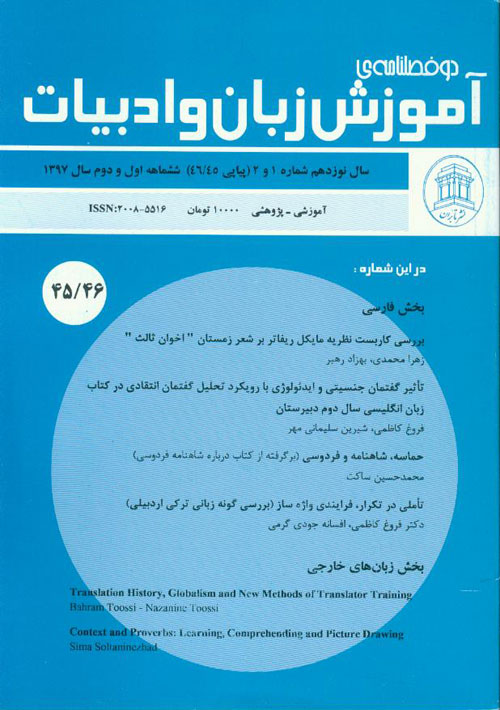فهرست مطالب

دو فصلنامه آموزش زبان و ادبیات
سال چهاردهم شماره 1 (پیاپی 35، شش ماه دوم 1392)
- 136 صفحه، بهای روی جلد: 40,000ريال
- تاریخ انتشار: 1393/03/20
- تعداد عناوین: 9
- بخش فارسی
-
صفحات 3-26
- بخش شعر و ادبیات
-
صفحات 29-30
-
Pages 3-26Praising mother land with love and deep devotion and expressing its venerability and glory can be considered a new branch of Iranian poetry and as preoccupations of constitutional era. It can be said that the concept of motherland during this time differs from the one perceived in old poems of the country which considered motherland different from what we can observe in contemporary poems. Motherland basically meant a land or habitat where the person was born with close relation to Islam. However, in modern era, the concept of motherland has been used with the meaning of a united sacred land, especially since the constitutional era. The people in our country with different local traits and languages have shared the same culture and common language for thousands of years. They love these shared features with zeal and prejudice. Such belonging to homeland, race, language and culture which is known as nationalism was created during the constitutional era and was strengthen during the reign of Pahlavi the first and many poets were engaged in this subject. In this article the writer has intended to review and criticize the poems of constitutional era which are related to praising motherland.Keywords: Contemporary poem, poems of the constitutional era, Homeland, Iranian homeland, Islamic homeland, Islamic Iranian homeland
-
Pages 1-15Foucault’s resistance to universal ethics is well known. He believes ‘The search for a form of morality acceptable to everybody in the sense that everyone should submit to it strikes me as catastrophic’ (Foucault 254). He distinguishes morality from ethics. Foucault’s ethics are about how a human being turns him-or herself into a subject. Unlike traditional ethics which are about obligation to others Foucauldian ethics are about the self’s relationship to itself. Oscar wild too challenges not just the Victorian values but also universal ethics such as truth or honesty. He deviates Victorian moral codes by using satire, pun or other linguistic devices to contemn Victorian moral codes; in the other words he creates a new set of ethics. This paper aims to find a relationship between Foucault’s approach to ethics and the kind of morality Oscar wild introduced in “The Importance of Being Earnest”, “A Woman of No Importance” and “Salomé”. Elaborating the Victorian social context paves the way to distinguish the differences between the conventional values of the era with the one in these plays and makes a distinction between the two leads to the individual morality which might be compatible with Foucauldian ethics.Keywords: Foucauldian ethics, Victorian moral codes, English Decadence, Aesthetic movement
-
Pages 17-31Khaled Hosseini's The Kite Runner provides a great deal of ethical insight for its readers. This novel draws attention to the issue of ethics in Afghan society. In fact, The Kite Runner is a good example to be scrutinized in the light of the continental French thinker, Emmanuel Levinas. His ethics gives priority to the Other over the Self and considers the ethical responsibility for the Other as the most crucial element in reconstructing subjectivity. Taking Khaled Hosseini's The Kite Runner, and regarding the ethical dimension of the encounter between the Self and the Other in Levina's viewpoint, especially his notions of face, responsibility and subjectivity, this paper sheds light on the specificity of The Kite Runner as a challenging literary text with the ethical issues which provides a context in which the hypothesis that salvation resides in fragmentation of one's own Self by putting an end to one's self-interested efforts, breaking out of the reductive and totalitarian structures of an ontological thought, taking infinite responsibility for the Other, and ultimately moving beyond the Other could be assessed.Keywords: Self, Other, ontology, responsibility, ethics, subjectivity, Levinas
-
Pages 33-48The first half of the nineteenth century saw the rise of a number of prominent Southern families such as the Compsons. These aristocratic families espoused traditional Southern values. Men were expected to act like gentlemen, displaying courage, moral strength, perseverance, and chivalry in defense of the honor of their family name. Women were expected to be models of feminine purity, grace, and virginity until it came time for them to provide children to inherit the family legacy. Faith in God and profound concern for preserving the family reputation provided the grounding for these beliefs. The Civil War and Reconstruction devastated many of these once-great Southern families economically, socially, and psychologically. Faulkner contends that in the process, the Compsons, and other similar Southern families, lost touch with the reality of the world around them and became lost in a haze of self-absorption. This self-absorption corrupted the core values these families once held dear and left the newer generations completely unequipped to deal with the realities of the modern world. We see this corruption running rampant in the Compson family. In this respect, the present essay is intended to demonstrate how the characters of The Sound and the Fury, in their social interactions respond to the Levinasain philosophy of Alterity (as a European ethics) and also to Martha Nussbaum’s theory of Emotions including Love and Compassion (as an American ethics) and that whether the characters’ moralities are more compatible with American moral codes or European ethics.Keywords: other, responsibility, the third party, alterity, love, compassion
-
Pages 49-63This article intends to examine familial relationships in Albee’s A Delicate Balance, through Emmanuel Levinas’s notions of “face”, “responsibility”, and “love”. Edward Albee in A Delicate Balance, illustrates American familial relationships of the late 1950s and the early 1960s in a society which boasts about its nuclear families – powerful fathers, dutiful and loving mothers, and nice children. This study aims to examine these familial relationships in American life from Levinasian ethical point of view in order to find how Americans respond to these ethical notions and whether their familial relations are ethical or not.Keywords: alterity, face, love, Other, responsibility
-
Pages 65-74This paper examines romantic love and construction of female subjectivity in Carol Ann Duffy’s selected poems from her main poetry collections based on chronological order. Duffy is the first female poet to become the poet laureate of the Great Britain and since the notion of love is one of the most important themes in her poetry, her poems contain the aspects of feminism and female experiences. Hence the construction of female subjectivity is significant as it is constructed by love in Duffy’s poetry. This essay illustrates concept of love that influence construction of the female subjectivity in its romantic form; since this paper applies a feminist reading in order to investigating the role of romantic love through the feminist perspective in the poems; the presentation of loving relationships differs in each of her poems in relation to female subjectivity and romantic concept of love. The paper also examines the women oppression and different kinds of loving relationships.Keywords: Female Subjectivity, Romantic Love, Oppression, Feminists
-
Pages 75-86This paper examines the concept of masculinity and its role in construction of female identity in family relationship framework in Carol Ann Duffy’s poems selected from her main poetry collections chronologically, and is organized in terms of thematic focus of her poems. Being the first woman poet laureate of the Great Britain after hundred years of male domination, situates Carol Ann Duffy’s poems in to the centre of the attentions of the feminism studies; besides one of the major themes of her poetry as a female poet, is portraying the women’s experiences in creating their own identity. Hence this study applies a feminist approach in order to demonstrate the construction of the female identity encountering the masculinity in family framework. Examining masculinity and construction of female identity in Duffy’s poetry tends to show a progression and shift in illustrating the concept of masculinity and its role in construction of female identity from the early poems to the last poems in chronological sequence family relationship framework.Keywords: Feminism, Masculinity, female Identity, Family Relationship
-
Pages 87-102Strategies are always important and effective in success in any work. So, to consider the outcome of any activity and its quality, investigation of the strategies used, is valuable. Thus, in language learning one of the fundamental questions is whether the speaking strategies used by the students are appropriate and effective on their speaking fluency or not. A study was undertaken with 15 advanced level students in Jahad-e- Farhangi Institute in Karaj. The students were chosen according to a proficiency test which was a part of the TOEFL test in the previous years. Then a questionnaire with Likert items ranged from 1 (0%) to 5 (100%), pilot tested before being used with the real participants, was given to them to be responded. After that all of them were interviewed in semistructural way individually to evaluate their fluency. The findings of correlation coefficient based on SPSS, demonstrated that the speaking strategies the advanced students of the mentioned institute use for increasing their ability in speaking fluency are almost appropriate for their aim, but not sufficient.Keywords: learning strategies, speaking strategies, fluency, questionnaire, interview, advanced learner


